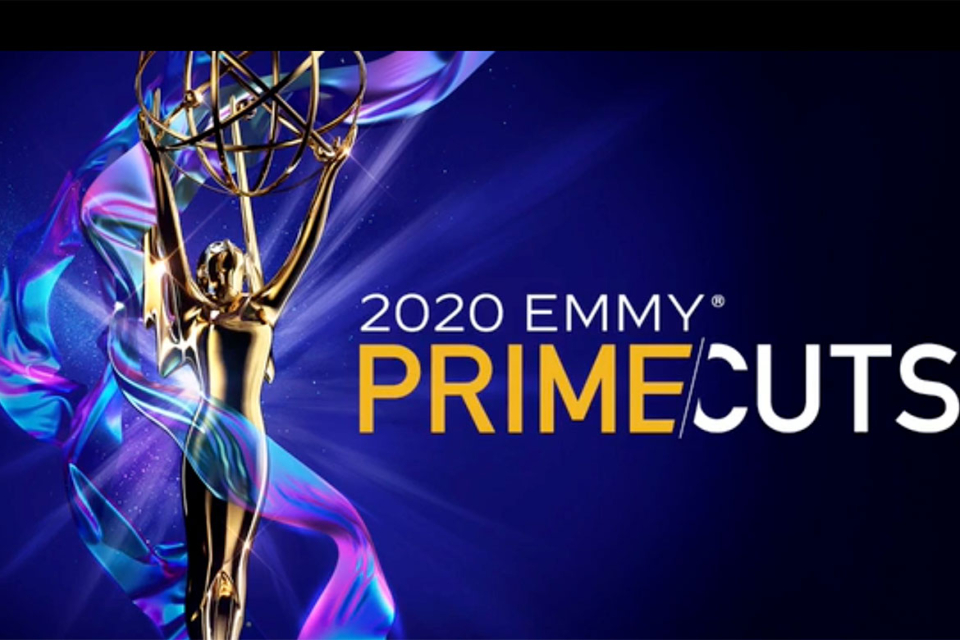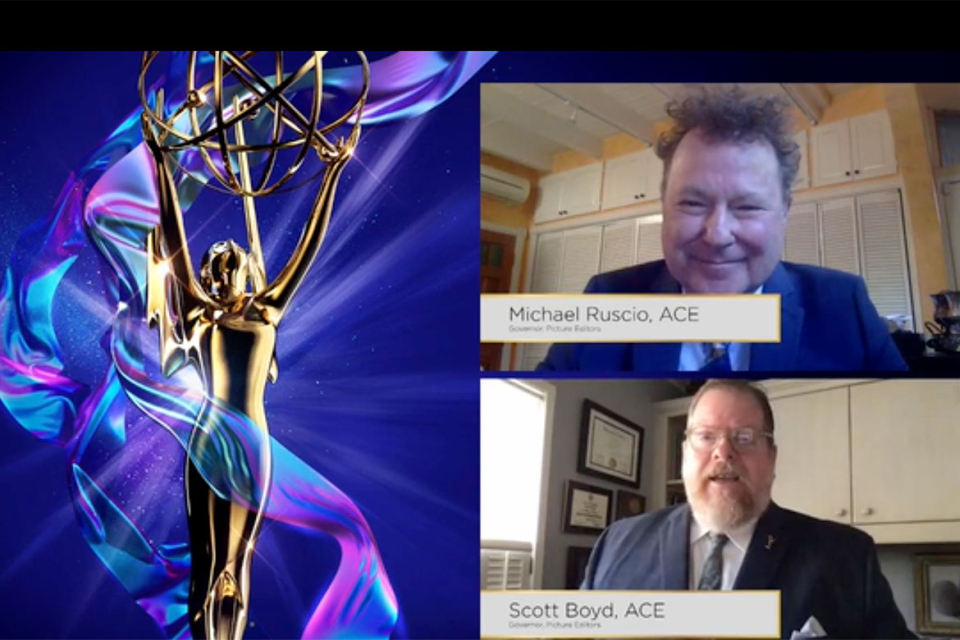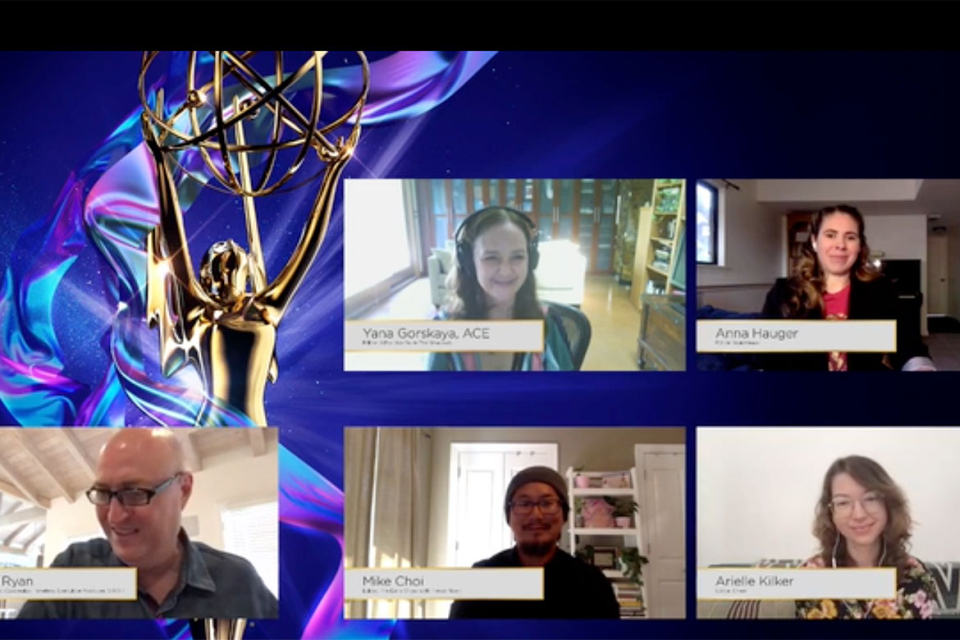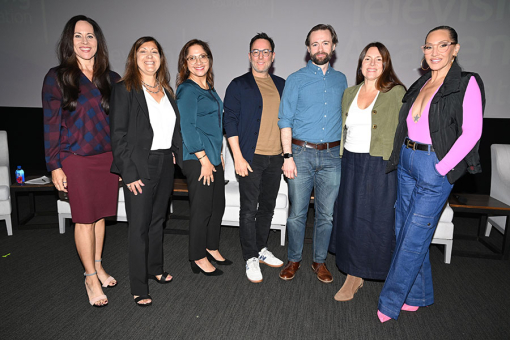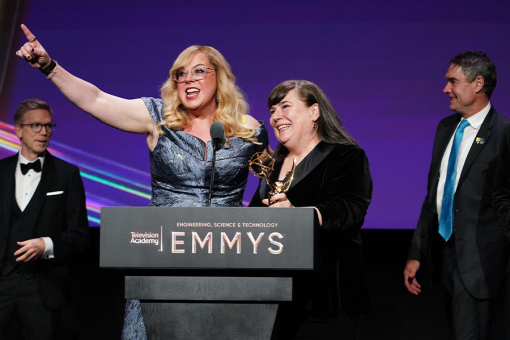To be a good editor, it helps to be a perfectionist – and a slight case of OCD doesn't hurt, either.
That was the not-entirely-joking consensus when a panel of Emmy-nominated editors gathered for the 14th annual program Prime/Cuts, a discussion of the art and craft of picture editing presented by the Television Academy's Picture Editors Peer Group Executive Committee.
Normally held at the Academy's North Hollywood headquarters and open to the public, the event this year was livestreamed October 3 to a global audience due to Covid-19, and archived for future viewing at emmys.com.
Of the four nominees; panelist Arielle Kilker won not one, but two Emmy statuettes this year for her work on the Netflix competitive-cheerleading docuseries Cheer, for Outstanding Picture Editing of an Unstructured Reality Program, as a supervising editor and for Outstanding Reality Program, as a producer.
Joining Kilker were Mike Choi, nominated for Comedy Central's topical satire The Daily Show with Trevor Noah, Outstanding Picture Editing for Variety Programming; Yana Gorskaya, ACE, for FX's vampiric What We Do in the Shadows, Outstanding Single-Camera Picture Editing for a Comedy Series; and Anna Hauger, for HBO's superhero dystopian drama Watchmen, Outstanding Single-Camera Picture Editing for a Limited Series or Movie.
Shawn Ryan, executive producer-showrunner of CBS's S.W.A.T., returned as moderator.
While most editors work in post-production, Kilker helped develop Cheer and even co-directed one episode. "it's so incredibly rewarding to be involved from the ground up and to be able to have relationships with the people, the subjects that we filmed within the field, and then bring that back into post, as we were putting this story together," she noted. "I lived with these cheerleaders for a good long time."
The number-one element on Kilker's mind when she edits is not sacrificing the truth for the sake of a good story.
"You don't make up anything," she said. "It comes down to a process of elimination, narrowing down what part of the story you're wanting to tell. The golden rule of documentary filmmaking is that you have to do right by your subjects: They've agreed to open themselves up to you and to the world.
"It's not so much trying to embellish so that there are inaccuracies, it's more just deciding what part of the story is important in terms of where the story ends up. A lot of it [becomes] reverse engineering, so that you can pay things off that you've set up at the front end in a really meaningful way."
When viewers saw a cheerleader named Lexi, who'd had a troubled past, encounter problems late in the six-episode series and be tempted to revert to her old ways, Kilker had already known the outcome when she was editing earlier episodes.
"Editing for documentary is more equivalent to writing," she said. "There are so many options of, how do we tell Lexi's story? What part of it matters? So knowing where she ends up is the guiding factor of deciding what part of the story to tell."
In contrast to documentary work, Choi, as an editor on a topical show, wakes up not knowing what he'll be editing for an episode that will air that night.
"it's a fine line that you're trying to find there," Choi explained. "And the line is, giving us enough time to not only make the show, but write the show. So you want to delay locking your script for as long as possible, especially in a time where the news cycle changes so quickly.
"I think the worst thing that could happen is breaking news that happens at around four o'clock, which is enough time that it could be like, 'Throw away everything we've done today. We're going to start all over.'"
With the Covid quarantine, the Daily Show team is working remotely from home, rather than in-studio; Noah records from his New York apartment. There are no longer any line cuts, in which a director calls shots from the various cameras in-studio; every graphic and sound is added in post. Guest interviews and other footage are transferred to the editors, who then send their finished product to Choi.
Choi compiles it all onto a hard drive. "And then," he related, "I run it off to a satellite truck that's parked outside my apartment. The truck then beams it to network operations, which then sends it out. It's a workflow that we came up with, out of necessity."
The pace can be overwhelming, but the team has pulled it off for every show. And working exclusively in post has its advantages when it comes to Noah's comedy bits.
"Once we accepted our limitations and embraced them," Choi said, "it really opened up opportunities for a lot of other things."
A different sort of teamwork was required for the three editors and nine episodes of Watchmen, which is based on a graphic novel and deals with such issues as racism, police brutality and generational trauma.
"It was extremely collaborative," Hauger said. "We would have discussions all the time about the script and what was coming up, what was happening here and in everybody else's episodes, and if there were moments that were going to play out later; we used flashbacks quite a bit. So we always had discussions about, if the flashbacks happened in somebody else's episode, what the best moments of those were.
"We'd often watch each other's episodes and discuss them as well. It's extremely helpful."
In one of her episodes, where a hallucinogenic drug trip evolved into a flashback, Hauger incorporated flash cuts, soft focus and sound design, with the flashback in black and white. And like Kilker, she had non-editing duties: providing the voice of a rocket ship and other elements in the show; she had lent her voice to the temp track and was asked to record for the show.
While the superhero-themed Watchmen is deadly serious, vampires are played for laughs in What We Do in the Shadows. Gorskaya credits her heritage with helping her be up to the task.
"I think [to work on a comedy series], you have to have that kind of overdeveloped sense of deadpan – being a Russian immigrant, I came to it very naturally," she said. "But I don't know that I'm the funniest person. The editors that I work with, I find very funny, but we're not comedians."
She ensures the episodes she works on maintain the humor, she added, by "having a strong sense of what is funny, and trusting it. I think it's just a taste thing, and hoping that your taste matches the writers'."
With artwork regularly featured on the show, everyone working on the show has become a skilled art researcher, Gorskaya added; she belongs to museums and pores through art history books to find just the right public-domain paintings. As for the actual editing, "we have a lot of improv and the scripts initially are on the long side, so figuring out the shape is a really elastic, exciting process."
Gorskaya's editing skills helped considerably when she began directing the show. "I didn't overshoot, and I got everything we needed," she said. "I also recognized things as I was shooting them as potential problems. I was thinking very much as an editor as I was there. It's a sense: you know when you have it and you can move on.
"It's a really ambitious show – it's shot very quickly, and there are stunts and improv and multiple locations. So being quick and knowing when to move on was extraordinarily helpful for me."
When asked what about their personalities makes them good editors, most noted their perfectionist tendencies; Choi also mentioned that his music background helped with his sense of pacing.
And the OCD? Most felt that editors tend to have at least a mild case.
"I always think it can be better. I'm always reworking till the last possible minute of turning something over," Gorskaya said. "It's also being really open to other people's good ideas – and sometimes, to their bad ideas, because something unexpected might come out of committing to trying something and making it work as best as possible. I'm not always right, and I've learned that. [So it's also] being kind of chill, and going with it."
Scott Boyd, ACE and Michael Ruscio, ACE are the governors of the Academy's picture editors peer group. To view a replay of the event, go HERE.

